- Home
- Jeff Mariotte
Bolthole
Bolthole Read online
Contents
Cover
Also available from Titan Books
Title Page
Dedication
Copyright
Prologue
1
2
3
4
5
6
7
8
9
10
11
12
13
14
15
16
17
18
19
20
21
22
23
24
25
26
27
28
29
30
31
32
33
34
35
36
37
38
39
40
41
42
43
44
45
46
47
48
49
50
51
52
53
54
Epilogue
Acknowledgments
About the Author
Also available from Titan Books
NCIS: Los Angeles™: Extremis
by Jerome Preisler
This book is for my Marcy Spring,
with all my love.
NCIS Los Angeles: Bolthole
Print edition ISBN: 9781783296330
E-book edition ISBN: 9781783296361
Published by Titan Books
A division of Titan Publishing Group Ltd
144 Southwark Street, London SE1 0UP
First edition: November 2016
1 3 5 7 9 10 8 6 4 2
This is a work of fiction. Names, characters, places, and incidents either are the product of the author’s imagination or are used fictitiously, and any resemblance to actual persons, living or dead, business establishments, events, or locales is entirely coincidental. The publisher does not have any control over and does not assume any responsibility for author or third-party websites or their content.
Copyright © & ™ 2016 CBS Studios Inc.
All rights reserved.
No part of this publication may be reproduced, stored in a retrieval system, or transmitted, in any form or by any means without the prior written permission of the publisher, nor be otherwise circulated in any form of binding or cover other than that in which it is published and without a similar condition being imposed on the subsequent purchaser.
A CIP catalogue record for this title is available from the British Library.
PROLOGUE
Ramadi, Iraq,
February 2007
Easy Street was anything but.
Al-Qaeda in Iraq forces were operating freely out of Ramadi’s Ma’Laab district, and Operation Murfreesboro was about to be launched to bring the district under control and take out the bad guys. The first step was going to be installing concrete barriers along what the U.S. forces had taken to calling “Easy Street,” to wall in the neighborhood. Once egress and ingress were controlled, terrorist operations would stop. Or that was the plan.
Trouble was, al-Qaeda snipers were working the rooftops of Ma’Laab, making even recon missions dangerous, much less the actual erection of the barriers. And enemy IEDs kept turning up on the American patrol routes.
Which was where the Navy SEALs came in.
A tiny handful of SEALs, the thinking went, could make the neighborhood safe enough for the Army to operate. The Navy encouraged such thinking, and the fact that the Army resented that just reinforced the Navy’s position. Officially, the branches cooperated. Unofficially—well, people were human, after all, and pride was one of the seven deadly sins to which members of the armed forces were sometimes most susceptible. Along with the other six. The annual Army–Navy Game was a mere shadow of the genuine rivalry between the two services.
That explained why Lieutenant Kelly Martin and Leading Petty Officer Bobby Sanchez found themselves inside the Ma’Laab neighborhood one dark winter night. Through an informant, they had a lead on the identity of one of the AQ snipers who’d been threatening both American troops and the Iraqi Army troops working alongside them. Three Iraqis had been killed and one American soldier badly wounded—he might still pull through, but the prognosis was poor—and the word on the street was that this particular sniper was claiming credit for all those shots.
Rather than being sent as part of a large force to find and take out the sniper, the two SEALs went in alone, confident in their ability to navigate the narrow, midnight roads undetected, kill the sniper, and get out again.
As it turned out, the sniper wasn’t alone. Three men were sitting with him in his living room. Martin and Sanchez later learned that two were his brothers and the third a distant cousin. At the moment, all that mattered was that the four men were sitting around a table loaded with an array of weapons, and when the SEALs rammed in the front door, each man lunged for the guns.
Sixteen pops sounded—suppressed, but still audible to the pair of SEALs and probably to people in neighboring apartments—and the four men were dead; sprawled this way and that. Blood trickled down walls and oozed from corpses, though the initial spurts—powered by hearts that were still beating—had stopped. The smells of gun smoke and blood and sweat and death mingled in the small room. The two SEALs performed a quick, efficient search of the place, turning up IEDs and cellphones rigged to detonate them, more guns and plenty of ammunition, and a laptop hidden inside an underwear drawer. They took the laptop and set a charge that would, five minutes after they left, blow up the IEDs; with their explosive force added to the small charge, the entire building would probably come down. Maybe the whole block, depending on how well constructed the buildings were and what other explosives might be contained within them.
If that happened, innocents would probably die. Martin knew that. But he also knew that if they didn’t blow up the IEDs, then someone else would come along and find them and use them against the Americans and their Iraqi allies. Probably soon, since he doubted that the sound of the door being bashed in had gone unnoticed.
And then Americans would die, as would Iraqi soldiers trying to fight to build a country that was not in the iron grip of a tyrannical despot. Martin wasn’t interested in the politics of it, he was interested in saving the lives of American service members—even if they were Army—and accomplishing the mission so they could all get home as soon as possible, ideally in one piece.
War was hell and people died. Even innocents. He couldn’t devote too much energy to thinking about that, because if he did the sorrow would paralyze him. He did what he had to do to protect himself and his own, and he hoped that his actions would open the door to some kind of self-rule that would one day benefit the vast majority of Iraqis.
Five minutes later, Martin and Sanchez were almost a mile away, somewhere in the warren of streets near the edge of the Ma’Laab. They heard the blast, saw the sky lighten as fire reached toward it. Martin, not a religious man, spared a quick thought for any noncombatants caught in its fury, and a corresponding but darker one for terrorists who hid among the very people they claimed to be fighting for, precisely to make finding and killing them more difficult for people of conscience.
When Martin heard gunfire, for a fraction of a second he thought it was some delayed echo from the explosion bouncing off the walls around him. But it went on, growing more intense, and it became clear that it was coming from ahead of them, not behind. He and Sanchez locked eyes—Sanchez’s were, in that moment, the eyes of a zealot, utterly lack
ing in doubt or uncertainty of any kind—and Sanchez said, “Come on!”
He started jogging forward without waiting for a response. Martin followed. There was a firefight going on, beyond the confines of the Ma’Laab, and that meant there were Americans involved because the Iraqi Army and police didn’t go up against al-Qaeda without Americans by their sides.
The SEALs burst across Easy Street, where soon concrete barriers would be in place, and raced toward the sound of the fight. They found it only a few blocks from Easy Street, at a low, freestanding building that could have been a warehouse or a small factory, but which Martin knew was a museum affiliated with Ramadi’s University of Anbar. The university wasn’t particularly old, but among its faculty were scholars and intellectuals reaching into Iraq’s past, and some of them had amassed a limited but important collection of artifacts stretching back to Sumerian days.
By the time Martin and Sanchez reached the scene, the gunfire had died out. They found four Americans—private security contractors, not military, though it was often hard to distinguish the difference—surrounded by seven dead Iraqis. Two of the bodies were clad in khaki uniforms of some kind.
One of the security contractors raised his weapon toward Martin and Sanchez, then lowered it when he saw they were Americans. The man was tall, gangly, with a youthful face that was drenched in sweat despite the cool night. His eyes were a luminous green that practically sparked with some inner fire. Martin didn’t think he would ever forget those eyes. They made him uncomfortable. They were the eyes of a man who had just killed several people and wished there were more.
“What happened here?” Martin asked.
The contractor ticked his head toward a truck painted the color of sand. “We were driving in from OP Virginia,” the man said. “Delivered some supplies out there earlier. We came around the corner and were ambushed.”
“You all okay?”
“We are, yeah,” the contractor said. “They’re not.”
“I can see that. How’d they do it?”
“Just waited for us to come around the corner, then they started shooting from the shadows.”
Martin eyed the truck. It was neatly parked about twenty yards back from the corpses, near the museum’s entrance. He couldn’t see any damage to it—the windshield looked whole, the tires solid, and there were no evident bullet holes.
“I’m sure you guys have more important things to do,” the contractor said. “Everything’s copacetic here. We’ll check out the truck and get back on the road.”
“You sure?” Martin asked. “We can provide—”
The guy cut him off with a dismissive wave of his hand. “Don’t worry about it. We’re cool.”
Martin caught Sanchez’s eye. Sanchez shrugged. “Whatever.”
“Okay,” Martin said.
“Thanks for checking in,” the contractor said. “Appreciate it.”
As Sanchez had so succinctly put it, Martin thought, Whatever. Something felt hinky about the whole thing. He didn’t like it.
But he had his job to do, and he had done it. Getting involved in the affairs of contractors was outside his purview.
In his opinion, they were nothing but mercenaries. Many were ex-military, jumping ship to private companies that promised to pay vastly higher salaries than the Department of Defense could. Martin had turned down offers that seemed exorbitant to him.
The difference was that real warriors didn’t do it for the money, they did it for their country. The loyalties of mercenaries were not to any flag, but to the company that held the dollars out in front of them.
Civilian leaders had decided to outsource many of the tasks that had previously been performed by service members to private companies, and it wasn’t Martin’s place to second-guess the whims of the Pentagon brass.
But he didn’t have to like it. And he didn’t have to like contractors who opened fire on foreign nationals, knowing that if there were any complaints about their actions, their employers would simply spirit them stateside.
Ducking responsibility for one’s actions didn’t correspond to courage, in his view. Just the opposite.
Martin was still steaming when he hit his bunk, the encounter with the contractors having put a sour gloss over the whole night’s work, despite the successful kill of the sniper who’d been targeting Americans. He hoped the captured laptop would provide actionable intelligence on other AQ members operating inside the Ma’Laab. When he finally fell asleep, it was with thoughts of what might be learned running through his head.
1
June 9
“Someday, G,” Sam said, “you’re gonna want to settle down with the right lady. She’ll be smart and sweet and funny and pretty, and you’ll want to put that ring on her finger. And in a little while—a year, two, maybe five at the outside—she’s going to want you to unpack your bag and stop sleeping on the sofa.” He glanced over at Callen’s dismissive expression. “You know I’m right.”
“You know what they say about bridges,” Callen replied.
“Don’t burn ’em while you’re still standing on ’em?”
“Don’t cross them until you come to them. If I meet that mythical woman, and if she’s everything you say she is and we decide to get married, then I’ll worry about unpacking. Until then, there’s no reason to jump the gun.”
Sam eased the black Challenger around a wide bend in the road. Like most Los Angeles streets, this one had been pretty straight, until it wasn’t. “Now you’re mixing your metaphors.”
“Mixing my… what do metaphors have to do with anything?”
“Jumping a gun has nothing to do with crossing a bridge, that’s all I’m saying.”
“The bridge was your thing. I was never even on the bridge. But if I was, and you were on it, too?”
“Yeah?”
“I’d throw you off, just to watch you fall.”
They were joking with each other because that was how they interacted best, but also because they were almost at the worst kind of crime scene, and neither one wanted to spend time dwelling on it until forced to.
And that was about to happen. Sam braked to a stop in front of a modest California bungalow. Two LAPD cars were already there, a cruiser in the driveway and an unmarked unit standing in the patchy yard. A palm tree stood at the edge of the corner lot, throwing uneven shade toward the house. It wouldn’t be enough to ward off the heat; already topping eighty-five, at 9:00 A.M., the day was going to be another scorcher in a summer full of them.
Sam glanced at his partner. “Ready?”
“As I’ll ever be.”
“Let’s do it.”
They climbed out of the vehicle and crossed the lawn, which was mostly weeds. A porch fronted the house, its stucco a faded pink, like salmon left too long in the sun. A young uniformed officer stood at the top of the three stairs, blocking entry. He held a clipboard in his hands. “Sorry, sirs,” he said. “Authorized personnel only.”
Sam and Callen flashed badges. “NCIS,” Callen said. “Office of Special Projects. We’re what they mean when they say ‘authorized personnel.’ Look it up in the dictionary and you’ll see our pictures.”
“Yessir,” the young cop said, flushing to almost the color of the house. “I mean no, sir, that won’t be necessary. They’re expecting you.”
“You want us to sign in?” Sam asked. He hadn’t slowed his pace; the officer had already stepped aside to avoid being mowed down.
“Not necessary, sir. I’ll just mark you down as OSP. Also?”
Callen paused in the doorway. “Yeah?”
“I’m sorry.”
Sam understood that what the man was sorry about had nothing to do with his behavior, which had been by the book. He meant it on a more personal level, and Sam appreciated the gesture. It didn’t really help, but then, nothing would, in this situation.
Sam, after all, had been a Navy SEAL. And so—if the report that had brought them here was accurate—had Bobby Sanchez, whose corpse they
were about to view.
Civilians sometimes thought warriors were accustomed to death, that it didn’t faze them. The truth was, they had to encounter it more often than anybody else, so they couldn’t let it slow them down, hamper their reflexes or dull their instincts. But every death hurt—especially that of a brother-in-arms.
They found Sanchez in the living room. Two detectives—Sam knew one of them, a hard charger named Sabrina Melloy—and a uniformed cop who looked ten years and twenty pounds past retirement were with him.
“The Marines have landed,” Melloy said. “Oh, wait, you’re Navy. You’re the guys who chauffeur the Marines.”
“It’s a little more complicated than that,” Callen said. “Actually, a lot more complicated.”
“Ignore Detective Melloy,” Sam said. “She used to date a Marine. She’s never been the same.”
“Happens to the best of them,” Callen offered. “Sad.”
“If you three are finished,” the other detective broke in, “I can tell you what we—”
“Save it,” Sam said. “Let us draw our own conclusions.”
The second detective was a man, older than Melloy, with thinning red hair, a drooping mustache, and sad eyes. The blue suit he wore was faded at the knees. He looked at Sam for a long moment, then shrugged. “Have at it. A field investigation unit will be here in a little while. This is the fourth homicide of the day, so they’re a little backed up. And it’s not even nine-thirty. Going to be a bad one.”
“Looks that way.”
The male detective tilted his head toward the door. “Let’s get out of their way, folks.” To Sam and Callen, he added, “We’ll be right outside. I’ll let you know when the crime scene folks show up.”
“Thanks,” Callen said.
The LAPD officers left the house, and with them went the last distraction from the reason Sam and Callen had come. Sam stepped back to the corner and tried to view the scene through fresh eyes.
The house probably dated from the first couple of decades of the twentieth century. It was built in a simplified Craftsman style, employing lots of dark wood, with wainscoting about two-thirds of the way up the walls and exposed ceiling timbers. The living room was separated from the dining room by a pocket door, but the dining room had been converted to a bedroom at some point. The kitchen was on the other side of the living room, visible from here only because its floor was tiled instead of hardwood. The furnishings were nothing fancy, and they’d been tossed around as if a tornado had targeted this specific room. There was a couch and a couple of chairs that could have come from Target or K-Mart or any other discount department store, a wooden coffee table and end tables, pictures on the wall that had probably been purchased in their frames, with little emotional connection to the house’s current occupant.

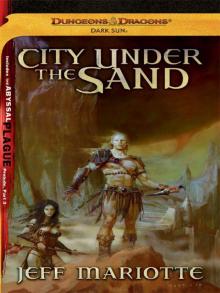 City Under the Sand
City Under the Sand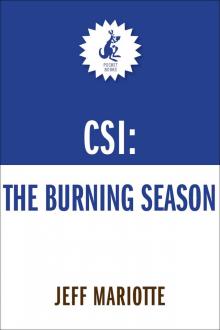 The Burning Season
The Burning Season Sanctuary
Sanctuary Winds of the Wild Sea
Winds of the Wild Sea Serpents in the Garden
Serpents in the Garden Close to the Ground
Close to the Ground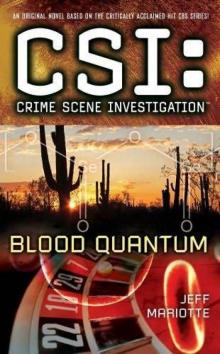 Blood Quantum
Blood Quantum Brass in Pocket
Brass in Pocket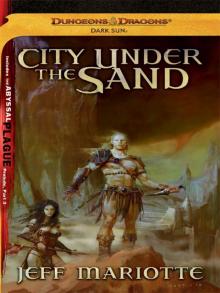 City Under the Sand: A Dark Sun Novel (Dungeons & Dragons: Dark Sun)
City Under the Sand: A Dark Sun Novel (Dungeons & Dragons: Dark Sun)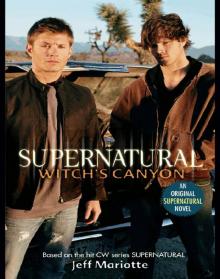 Witch's Canyon
Witch's Canyon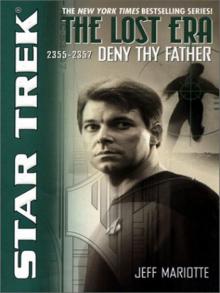 STAR TREK: The Lost Era - 2355-2357 - Deny Thy Father
STAR TREK: The Lost Era - 2355-2357 - Deny Thy Father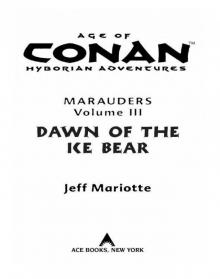 Dawn of the Ice Bear
Dawn of the Ice Bear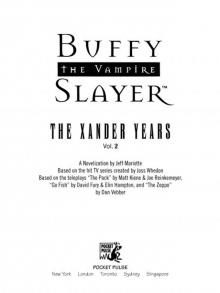 The Xander Years, Vol.2
The Xander Years, Vol.2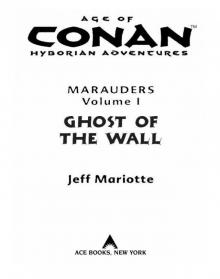 Ghost of the Wall
Ghost of the Wall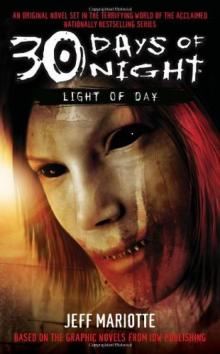 30 Days of Night: Light of Day
30 Days of Night: Light of Day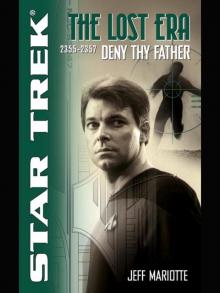 Deny Thy Father
Deny Thy Father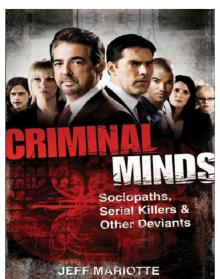 Criminal Minds
Criminal Minds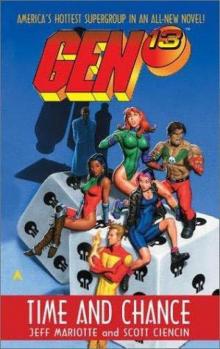 Time and Chance
Time and Chance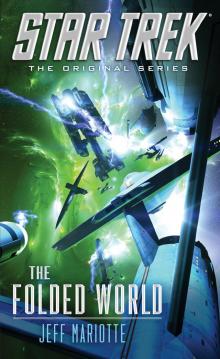 The Folded World
The Folded World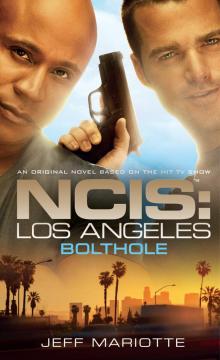 Bolthole
Bolthole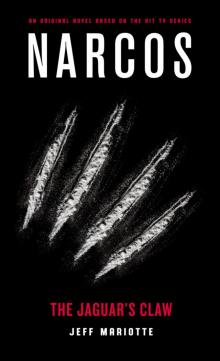 Narcos
Narcos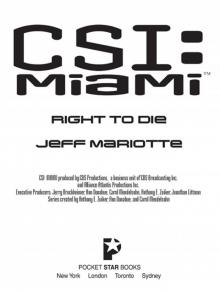 Right to Die
Right to Die